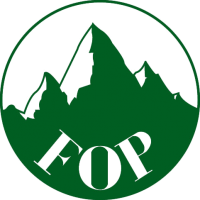Harvard University is located on the traditional and ancestral homelands of the Massachusett tribe. The history of FOP and Native American tribes including the Massachusett, Nipmuck, and Wampanoag Nations are intricately intertwined. Matthews Hall, the location of the FOP office space, marks the place where the Harvard Indian College stood from 1650 until its permanent closure in 1677. Indian College was built with the support of the English Society for Propagation of the Gospel in New England, whose mission was to convert Indigenous communities to Christianity. Tied to this legacy, FOP’s foundation is quite literally grounded in Harvard’s colonial past.
FOP’s colonial legacy also continues into the present. The program was founded in the 1970s by wealthy white men who viewed land as a glamorized playground rather than the traditional and ancestral homelands of Indigenous peoples. FOP was created alongside a longer “New England” naturalist tradition that has largely ignored or romanticized Indigenous peoples. This fundamental misconception shaped the program’s structure, providing students with recreational opportunities while simultaneously denying the lasting presence of Native peoples and their ongoing connections to their homelands. Although the dominance of whiteness and masculinity within FOP and the larger outdoors community is being increasingly discussed, FOP must also address its colonial past and present.
This acknowledgement is only the first of many steps our community must take in order to create a more accountable and critically-engaged program that honors Indigenous life and land. We are committed to:
-
Requiring that all FOP leaders participate in a decolonization training
-
Discussing on all FOP trips the history of the land each group is recreating on
-
Forming partnerships with the Harvard University Native American Program (HUNAP) and local Native American organizations
-
Recruiting and including a diverse group of FOPpers and leaders, including Native and Indigenous students at Harvard
-
Striving to eliminate white supremacist and colonial tendencies from our program and the greater Harvard community
-
Continually reflecting, re-evaluating, and learning
 Harvard First-Year Outdoor Program
Harvard First-Year Outdoor Program